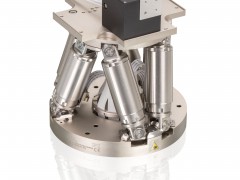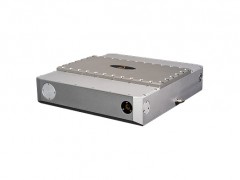

A new technique boosts the power output of tiny, chip-mounted terahertz lasers by 80 percent. Courtesy of Demin Liu/Molgraphics.
The standard method for producing power-efficient sources of terahertz rays involves a bulky, power-hungry tabletop device. Researchers at MIT, Sandia National Laboratories and the University of Toronto have created a device that is a variation of a quantum cascade laser with distributed feedback; it allows the optimum performance of terahertz rays.
Until now, however, the device has had a major drawback — it naturally emits radiation in two opposed directions. Since most applications of terahertz radiation require directed light, a device like this would squander half of its energy output. The research group has found a way to redirect 80 percent of the light that usually exits the back of the laser, so that it travels in the desired direction.
Ali Khalatpour, a graduate student in electrical engineering and computer science at MIT, said the design is not tied to any particular medium or combination of materials in the body of the laser.
"If we come up with a better gain medium, we can double its output power, too," he said. "We increased power without designing a new active medium, which is pretty hard. Usually, even a 10 percent increase requires a lot of work in every aspect of the design."
Bidirectional emission is a common feature of many laser designs. With conventional lasers, however, it's easily remedied by putting a mirror over one end of the laser. But the wavelength of terahertz radiation is so long, and the researchers' new lasers — known as photonic wire lasers — are so small, that much of the electromagnetic wave traveling the laser's length actually lies outside the laser's body. A mirror at one end of the laser would reflect back a tiny fraction of the wave's total energy.
The researchers' solution to this problem exploits a peculiarity of the tiny laser's design. A quantum cascade laser consists of a long rectangular ridge called a waveguide. In the waveguide, materials are arranged so that the application of an electric field induces an electromagnetic wave along the length of the waveguide.
This wave, called a standing wave, is inert and will not radiate out of the waveguide. The researchers cut slits into the waveguide, which allow terahertz rays to radiate out. The slits are spaced so that the waves emitted reinforce each other with their crests coinciding only along the axis of the waveguide. At more oblique angles from the waveguide, they cancel each other out.
The researchers put reflectors behind each of the holes in the waveguide, a step that can be seamlessly incorporated into the manufacturing process that produces the waveguide itself. The reflectors are wider than the waveguide, and they're spaced so that the radiation they reflect will reinforce the terahertz wave in one direction but cancel it out in the other.
The new device has been selected by NASA to provide terahertz emission for its Galactic/Extragalactic ULDB Spectroscopic Terahertz Observatory (GUSTO) mission.
- RoboSense is to Produce the First Chinese Multi-beam LiDAR
- China is to Accelerate the Development of Laser Hardening Application
- Han’s Laser Buys Canadian Fiber Specialist CorActive
- SPI Lasers continues it expansion in China, appointing a dedicated Sales Director
- Laser Coating Removal Robot for Aircraft
 FISBA exhibits Customized Solutions for Minimally Invasive Medical Endoscopic Devices at COMPAMED in
FISBA exhibits Customized Solutions for Minimally Invasive Medical Endoscopic Devices at COMPAMED in New Active Alignment System for the Coupling of Photonic Structures to Fiber Arrays
New Active Alignment System for the Coupling of Photonic Structures to Fiber Arrays A new industrial compression module by Amplitude
A new industrial compression module by Amplitude Menhir Photonics Introduces the MENHIR-1550 The Industry's First Turnkey Femtosecond Laser of
Menhir Photonics Introduces the MENHIR-1550 The Industry's First Turnkey Femtosecond Laser of Shenzhen DNE Laser introduced new generation D-FAST cutting machine (12000 W)
more>>
Shenzhen DNE Laser introduced new generation D-FAST cutting machine (12000 W)
more>>
